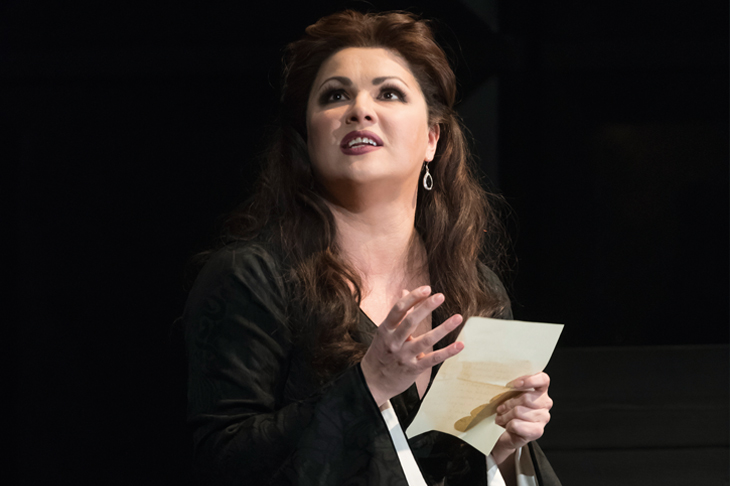At last, a great time at the Royal Opera: a magnificent performance, in every way, of Verdi’s Macbeth, curiously but pleasantly beginning at 3 p.m. This is the fourth outing of Phyllida Lloyd’s 2002 production, and the finest by a long way, though each of the previous series had its merits.
If my memory serves me rightly, and it very likely doesn’t, Daniel Dooner, the revival director, has made significant changes to the production. What previously struck me as tolerable seemed, in this revival, thoughtful, imaginative and genuinely helpful to the drama, qualities that I had given up hope of experiencing in a major opera house. Oddly, that meant that the striking unevenness of this opera became more evident, with the blame to be laid firmly at the composer’s door. Still, up to the interval, which came after Act Two, enjoyment is unalloyed. There is the tense Overture, one of those in which Verdi doesn’t bother to join the themes, merely lays them side by side. Then come the jovially sinister witches, in black with red turbans, and the powerful drama immediately gets under way, sweeping along to the murder of Duncan, the assorted reactions to it, and through to the great banqueting scene and the ghost of Banquo.
All this is far greater than anything Verdi had achieved before or would again for some time, and it is realised at the Royal Opera virtually perfectly. Verdi famously said that he wanted ‘the Lady’, as he called her, to be almost voiceless, hardly to sing at all, and so on. If he really meant that he would have been shocked by Anna Netrebko, for she gave one of the most stunning vocal performances heard in this theatre for many years. Her voice is now enormous, but miraculously retains its flexibility and range of colour. It is completely at her command, absolutely steady, and deployed with rare dramatic intelligence. Verdi would have been disarmed.
Netrebko and the Serbian Zeljko Lucic have been a team in this opera for some time, memorably taking part in a Met: Live relay a couple of years ago. Until the intervalI found Lucic very slightly underpowered, less impressive than I have known him; but in the last two acts he was on his usual form, and so they were as powerful as they can be — or as powerful as they can be in this version of the opera, in which the decision has been taken to mix the original 1847 version with the one that Verdi made for Paris 18 years later. It seems to me that his decisions in 1864 about what to change were entirely for the better; they included eliminating substantial sections of the last act, the result being abrupt but effective. What the earlier version shows, all too plainly, is that though he found Lady Macbeth fascinating and complex, he couldn’t make up his mind as to what Macbeth himself was really like, and so failed to create a credible character. This means that as soon as ‘the Lady’ is dead, he needs to be got out of the way as soon as possible. That is my only criticism of the production.
The subsidiary characters are all powerfully cast, with Ildebrando D’Arcangelo an eloquent Banquo. The scene in which he is killed is perhaps the most moving in the opera. And Yusif Eyvazov makes a strong contribution as Macduff in the refugee scene. Perhaps most impressive, next to Netrebko, is the chorus, on stupendous form, whether in uneasy celebration in the banquet scene, in horror when the King’s murder is revealed, or in lamenting their exile. Needless to say, Antonio Pappano is the moving agent before and behind this great achievement.






Comments